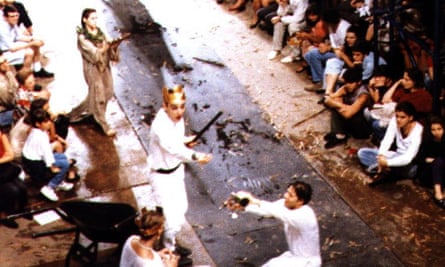In the Brazilian television programme for children Castelo Rá-Tim-Bum, the money-grubbing villain, Dr Abobrinha, wants to demolish a magical castle and build a tower of flats in its place. The plot is fictional, but the parallels with a fight currently playing out in downtown São Paulo are hard to ignore.
Last month, the TV presenter and business tycoon Silvio Santos finally won approval to build three 100m-high residential blocks on land he owns in the Bixiga district.
He had been lobbying to do so for decades, but was denied every time: the three towers would circle Teatro Oficina, one of the city’s best-loved theatres, blocking out the large window and retractable ceiling that are integral to its modernist design.
Dreamed up by the Italian-Brazilian architect Lina Bo Bardi, who was behind many of the country’s most famous buildings, Teatro Oficina is long, narrow and open-plan: “very much not the shape theatres are meant to be”, as the Observer’s architecture critic Rowan Moore wrote in naming it one of the world’s best theatres, “but all the more intense for that”.
So when on 23 October the state’s historical heritage office decided to reverse the theatre’s protected status, allowing Santos to build his towers and block out the theatre’s tiny strip of space and light, São Paulo’s artistic community rallied round, in what is as much a symbolic cultural battle against a cartoonish villain as a planning one.

In Teatro Oficina’s corner is José Celso Martinez Corrêa, best known as Zé Celso: tall and talkative, with an energy that belies his 80 years. An actor and playwright, he was a student at the University of São Paulo’s prestigious law school when he co-founded the experimental amateur dramatics group. It soon made a name for its challenging spectacles, which involved sexual situations, nudity and all manner of drugs, consumed live.
Teatro Oficina would prove central to Brazil’s counterculture tropicalismo movement of the 1960s and 70s. Its spirit was captured by the poet Oswald de Andrade’s 1928 manifesto and its famous line “Tupi or not Tupi”. A play on words involving the flesh-eating practices of the indigenous Tupinambá people, to modernists it meant the imperative to devour outside influences.
Teatro Oficina, to Celso, was an attempt to create something truly Brazilian: “I’ve stopped being colonised, and decolonised others,” he says.
Silvio Santos, on the other hand, is a former street vendor who become one of Brazil’s richest men. He owns SBT, the third-biggest television network, as well as the Avon-esque cosmetics giant Jequiti – and a great deal of property. He has been a ubiquitous TV personality for more than 50 years; in 1989, he unsuccessfully ran for president.
Santos bought the plot of land surrounding Teatro Oficina in the 1980s, and has sought for decades to build on it. To protect the theatre, classical pianist João Carlos Martins, then secretary of culture, declared it a heritage building in 1984. “I told Zé Celso, at the time, that São Paulo without the Oficina was not a theatrically enterprising city,” he says.

“Silvio Santos is smearing his legacy. Some personalities bother to leave a positive impression with society at the end of their lives. He is doing the opposite.”
The shock decision of the Council for the Defense of Historic, Archaeological, Artistic and Tourism Heritage (Condephaat) that Santos’s proposal would not affect Teatro Oficina’s architectural value caused experts to bristle.
A gallery of seats, built out of scaffolding, looks out through an 120 sq m window. Part of the ceiling can also be removed, charging the performances with the bustling atmosphere of the Bixiga district. Bo Bardi devised the window because Celso felt the theatre was claustrophobic. There were frequent police raids during the 70s, and he and a friend, both of them tripping on LSD, had literally run into a wall while attempting to escape from officers.
“It was a very difficult time,” he recalled in a 2012 interview. “When the police raids began, we began to get worried, so I went to talk with Lina. She said, ‘I’m an architect! I can’t go through walls! I’m not a witch! All I can do with walls is break them down.’”
An online petition has condemned the proposed “cultural assassination”, and the Instituto dos Arquitetos do Brasil (IAB) and other culture and heritage groups have been equally scathing an open letter. They argue that the unobstructed view from the theatre is central to Bo Bardi’s design.

“The Teatro Oficina surpasses the limits of its external walls ... establishing a singular relationship between the theatre and the city,” the letter reads.
Indeed, Bo Bardi’s vision for that relationship extended to a public park, on the plot where Santos is set to build his apartments; she died in 1992 before it could be realised.
The mayor of São Paulo, João Doria, mediated a tense encounter between both sides in August. He proposed a blend of park and commercial development; Santos has not yet responded, and cancelled further meetings. The federal government has offered Santos land in exchange for the plot around Teatro Oficina, but he has refused that, too, and will not speak to the media about his plans. (Santos refused to comment to Guardian Cities.)
Santos’s proposed “high standard” apartments are expected to fetch correspondingly high prices, well above the $450,000 reais (£104,000) asking price of a current listing in an old building next to the theatre. One estate agent estimated that prices for the more lavish dwellings in Santos’ development could near 1m reais (£231,000).
The influx of residents would inevitably change the nature of Bixiga, too: founded by Italian immigrants, the neighbourhood is known for its nightlife and cultural institutions.
“This is a neighbourhood of artisans,” says Marília Gallmeister, an architect employed by Teatro Oficina. Historically, she says, much of Bixiga has been self-sufficient, with private homes doubling as businesses serving the rest of the neighbourhood. This means that the gentrification present elsewhere in São Paulo has largely been held at bay.

“But a project of this magnitude can set a dangerous precedent, as we’ve seen in downtown ... and around the world in places like SoHo, in New York,” says Gallmeister. “The arrival of a large number of people to occupy expensive apartments will raise the value of the land – and the residents who have built the neighbourhood may be expelled to the periphery because they can no longer afford to rent there.”
Other theatres in São Paulo are already feeling this impact. At the newly revitalised Praça Roosevelt, the Espaço Parlapatões and Os Satyros theatres have struggled to hang on to their spaces against the tide of gentrification.
“Brazil is a country where culture never gets any money,” says Fernanda Montenegro, 88, an icon of Brazilian television and cinema who remains the only Brazilian woman to have been nominated for the Oscar for best actress. She and her daughter, Fernanda Torres, also an actor, are among the high-profile members of the campaign to save Teatro Oficina, which built to a protest at the theatre two weeks ago.
This article includes content provided by Instagram. We ask for your permission before anything is loaded, as they may be using cookies and other technologies. To view this content, click 'Allow and continue'.
Another demonstration on Sunday – billed as an “embrace” of the theatre – was attended by as many as 1500 people. Many wore T-shirts emblazoned with a direct appeal: “Silvio Santos, give a gift to São Paulo”.
But if Teatro Oficina’s influence on Brazil’s counterculture has won it many supporters, it has also shored up its opposition. Santos is backed by the conservative movement sweeping Brazil, which despises any art it considers immoral, or merely superfluous.
Since president Dilma Rousseff was impeached in 2016, Movimento Brasil Livre (Free Brazil Movement) and other far-right groups have gained mainstream traction, with art – particularly that tackling gender, or sexuality – among their targets.
Montenegro says she has been the target of online abuse for her public defence of artistic expression. “Everything Teatro Oficina represents in terms of freedom, danger, the sacred and profane, is what is being criminalised,” says Torres, her daughter.
The battle against Grupo Silvio Santos represents the “clash between antagonistic visions of culture and city”, she says. “They want to build another toothpick, in a city that does not need more toothpicks.”
Santos is now preparing to vault his final hurdle – the endorsement of municipal and federal authorities. The Municipal Council for the Preservation of Cultural, Environmental Department (Conpresp) was hand down its decision on Monday, but it was postponed a week by order of the Tribunal de Justiça.
If the city finds in Santos’ favour next week, he will still need to win approval from the Instituto do Patrimônio Histórico e Artístico Nacional (Iphan). But Celso is concerned. This may be the final standoff in what he has described as “30 years spent punching holes in the walls, just like a real family feud”.
Like many family feuds, too, it is a battle for legacy. Santos turns 87 next month. At their meeting in August, Celso pointed to their old age as a reason to favour Lina Bo Bardi’s park. Together, he suggested to Santos, they would bequeath something beautiful and green to the concrete city.
Santos responded with a joke. “I do not intend to die.”
Guardian Cities is in São Paulo for a special series of in-depth reporting and live events. Share your experiences of the city in the comments below, on Facebook, Twitter and Instagram using #GuardianSaoPaulo, or by email to saopaulo.week@theguardian.com

Comments (…)
Sign in or create your Guardian account to join the discussion